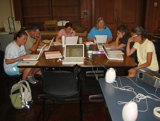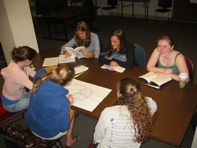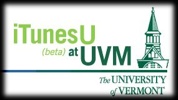Students Thinking
I felt crummy about the sharing I’d done at the faculty workshop. Asked to present my work with Podcasting, I told my interested colleagues that I was a “sometimes user” of the technology. Why sometimes? Well, I needed to be convinced that the work that went into creating a podcast was worth the effort. And for me, an education professor of an embarassingly long number of years, “worth” means high quality learning – personal understanding and depth, not just acquisition of someone else’s knowledge. I needed to be convinced that aside from having a good time with a new technology – I love the challenge of just getting the stuff to work while 35 pairs of eyes hold you accountable – my students were actually learning more and better than they would in a more conventional task.
This little essay is about my next steps and how I’ve come to understand and see that different, and yes, better learning is happening. I’ve figured some things out.
My class is a first year required 8am in the morning two days a week introduction to learning theory for maybe-teachers-to-be. It is my personal wish that the students who walked through the door on day one wanting to be a teacher emerge from my class more psyched than ever, and more real in terms of their perceptions about what their future classrooms of children will call upon them to do. It is my personal wish that the students who walked through the door on day one not so sure they wanted to be a teacher at least emerge from my cocoon clearer in their vision of who they might be and more informed of what the profession will call upon them to do. For all my students I wish they realize they are not the center of this universe and that they must appreciate the similarities and differences in the people who populate the world around them. I want them to know that being a teacher in the 21st century will call upon them to more skillful than any generation of teachers coming before them. Finally, I want all my collegiates to be able to articulate how all students “learn in the same way” as a way of developing an informed perspective on that potential cop-out phrase, “Well, all students learn differently.”
It’s a form and content issue for me. I do believe we all learn differently when it comes to the content of our lives, lives that have populated our conceptual structures. I also think that those conceptual structures of prior knowledge get built in pretty much the same way for all of us, biologically speaking. Our learning process is a whole lot more similar than it is different. At least that’s the mantra I want to discomfort their lives with two days a week at 8 in the morning. Did I mention that already?
So, where does Podcasting and learning enter this picture? As my bridge to understanding the similarities of learning of all human beings, we dig into James Zull’s The Art of Changing The Brain right off the bat. And for purposes of this little essay, I want to immediately narrow to my point. After spending some time describing how the brain works, and how that working can be described quite nicely through the descriptive learning cycle research of Kolb, Zull begins to deepen the reader’s understanding of how the rear integrative cortex and the frontal integrative cortex work to structure active thought and action from prior knowledge. Of the writers use of image and text, he notes the “unskilled use of language by the learner is one of the greatest challenges for the teacher.” Delving into the work of Robert Leamnson, he goes on to say he was “intrigued” by the idea that “insisting that students speak to him about the academic content of subject matter using complete, grammatically correct sentences.” He admonishes us that planning done by the executive functions of the prefrontal cortex (metacognitively speaking, of course) “requires learners to carefully assemble their plan for speaking. This plan must have specific content, and that content must be arranged in a way that accurately conveys the image that is in their brain. No clear image, no plan!” Here, Zull is talking about the importance of students being asked to write informational text, non-fiction text that is written to explain an idea or demonstrate understanding of a concept or set of rules or to establish connections between events or whatever. It is, as my literacy colleagues note, writing for a purpose.
Plans mean a good deal to Zull, for it is in the plan of action, the sequence of steps that helps transform prior knowledge to newer understandings through action, that understanding and comprehension get constructed. What I figured out and am about to explain, is that the Podcast requirement created a context for my students to have to plan a way to verbally explain a consolidation of big ideas and details from the chapters they were reading. Read on.
Reading Zull, especially these latter chapters, is a bit of a challenge. He writes iteratively. Having established his big ideas in the first part of his book, he goes back in the latter chapters and deepens his analysis of the relationship between what teachers and learners do and how the workings of the brain might inform the teaching / learning relationships so both teacher and learner might at the end of the day, feel they had spent good time together. I wanted my students to “get deeper” along with Zull. I’d had them meet in chapter groups, process and unpack the chapters, and take responsibility for connecting the high points by means of a webct based discussion. In short, I wanted them to achieve a deeper synthesis between the big ideas and the details.
I get the fact that students have to actively work on the ideas of our class learning and I get the fact that doing it together in class pays special benefits. It is way too important work to assume they are going to do more than just passively read their work and answer whatever assignment I put before them. If I want them to process our work, I want them to do it where I can see it and hear it and comment on it. Podcasting, on the heals of collaborative classroom discussion, extends the benefits of active learning by providing a reason for putting things together while at the same time, after the amygdala calms down, can create a little fun and laughter as well.
What I got on the webct discussion board were big ideas and details but not much synthesis. Some of why that happened might have been the way I structured the discussion, some of it might have been due to the nature of webct threaded discussions. Nevertheless, my joy in realizing my astuteness in noticing that I’d arrived at little synthesis was dulled by what I in fact noticed. My students’ prior knowledge hadn’t really been deepened by establishing more connections between the details of the chapter and the bigger ideas introduced in the first part of the book. Most of them had merely stated the big ideas, and merely stated attendant details. It was underwhelming, or in some cases, to quote the late Howard Cosell, merely whelming work.
Here’s where the podcast came into play. We spent our last class period back in those same groups. This time the classwork assignment to each group was to create one 45 second to two minute podcast that “pulled together” the information in their chapter. What I’d realized on an early morning dogwalk (1) was that unlike an individual writing assignment, the group podcast might force the synthesis they’d been unable to achieve in the group based discussion board offering. I gave them twenty minutes to review their discussion entries (which I graciously provided), plan their podcast content and presentation and then come find me. I, with my trusty iPod, iTalk microphone, and later, Garageband software, would record what they had to say, make a podcast, and place it on UVM’s iTunesU site.
The first group was ready to go in twenty minutes. They passed the iPod around and created a 1 minute 30 second synthesis of their chapter, effectively tying together detail and big idea unlike their first attempt. Each of the other four groups followed, each employing a slightly different style but each having achieved a degree of synthesis that gained a smile from their teacher. These reports ranged from whelming to overwhelming, again to quote Cosell. This was synthesis and this was deepened thought. Tenderly attached, no doubt, but Zull would have us believe, this was concrete, physical brain change.
The pressure of the Podcast forced the synthesis. In that way, the Podcast was not only a jazzy new tool, it was a tool employed as an agent of active learning, a form of learning that has had a long and occasionally controversial place in higher education (TP Msg. #818 Quick-thinks: The Interactive Lecture). Important active learning, I might add. I do understand that some students just because they have to speak into an device will be rehearsing new material in a more meaningful way than if the were to sit in a chair and “think about it” or even draw a webbed diagram. But the idea that the social conversation in the groups was directed at forcing a synthesis across the different student’s individual offerings is a powerful impetus to me to do more work with p-casting now that I have a way of understanding how it is indeed more “worthwhile” as a learning tool. I realized, “just talk” can be something quite powerfully rendered with the right directions and the right tool Granted, their work on webct might have been a really effective way of structuring a rehearsal for the final pod casting performance. Whatever. What I left feeling good about was that I’d figured out another way to scaffold my student’s understanding of content I feel deeply about. I want them to reconsider their thoughts about children’s learning capabilities, particularly those children who can so easily be stereotyped as at-risk and incapable of learning anything that’s worth very much simply because they are “different.” As new “maybe-teachers,” I want them to see all children as capable learners; this information about the biological basis of learning helps support that assertion. Many learning problems are teaching and schooling errors. But that’s a conversation for another time. Maybe the next Podcasting presentation.
Thanks for listening.
(1)



